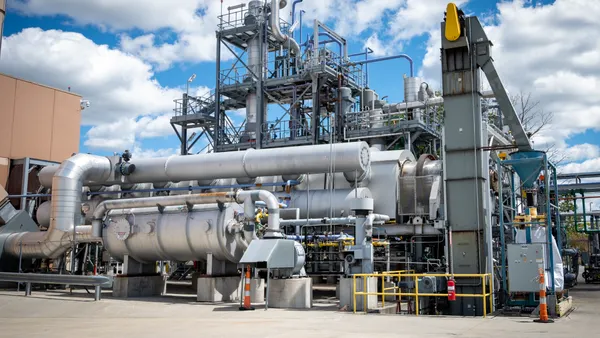Dive Brief:
- Houston’s curbside recycling costs may double and the city may also absorb a cost for a drop in commodity prices if the city enters a proposed four-year deal with Waste Management. Based on the current volume of recyclables Houstonians generate and current commodities prices, this shifted financial model will cost the city more than $3 million a year.
- Under the recently expired contract, Waste Management resold recyclables it collected, deducted a $65-per-ton processing fee, and returned 70% of the remaining revenue to the city. Waste Management also assumed the loss if it made less than the fee it charged the city. Due to the losses the company has sustained through its recycling services, Waste Management has reworked about 80% of its municipal contracts, CEO David Steiner said last week, according to Houston Chronicle.
- The new $95-per-ton processing fee, based on commodities’ current value, means each ton will cost Houston almost $50, which is nearly double the cost to landfill. Two years ago the city made $25 per ton for its recyclables.
Dive Insight:
Houston has collected about 211,000 tons of recyclables since 2009. At the time, recycling was not only what the city considered the right thing to do, but it was a money maker; shielding the city from $5.7 million in landfill fees and generating profit from commodities’ sales.
Now the city, which was already financially strapped, says it will need to layoff employees due to budget shortfalls.
"As much as we are for recycling, I'm also against cutting people that are actually doing city services," said Councilman Michael Kubosh to the Houston Chronicle. "It's going to hurt to lay people off and then to tell them we laid them off because, 'Well, we want to recycle.' We've got to think it through."
Cities around the country are facing the same issues. Not far away, Dallas decided to build a high-tech MRF hoping the move will help the city stay up on top of its trash and budget, avoiding taking a loss through dealings with another plant.
In its glory day when the Dallas program made money, the city leveraged that profit to grow its recycling culture, expanding its small, dual-stream bin program launched in 1990 to include single stream in 2009 and continuing to stretch out to more of its people. One year ago, Houston reached every homeowner for the first time.
Councilman Jerry Davis wants to stay with the program.
"With the rate we're growing, we have to find a way to get rid of our waste in an efficient manner. What are we going to do when all our landfills are full? … I don't think we need to steer away from sustainability because the market is somewhat volatile," said Davis to the Houston Chronicle.









